ASRock's new AMD entry-level gaming GPUs look enticing — custom Radeon RX 7600 XT GPUs with boost clock speeds up to 2,810 MHz
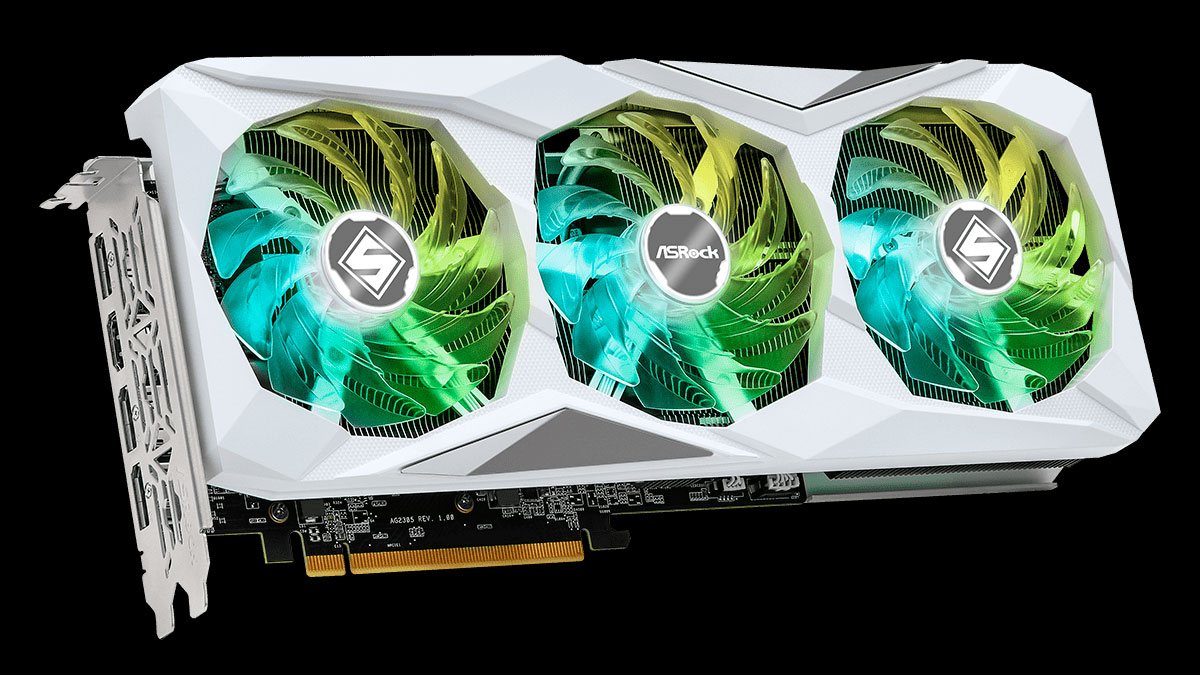
AMD's looming Radeon RX 7600 XT is poised to replace the regular Radeon RX 7600 as one of the best graphics cards available. ASRock has unveiled the Radeon RX 7600 XT Steel Legend and Radeon RX 7600 XT Challenger based on the Navi 33 (codenamed Hotpink Bonefish) silicon and wielding 16GB of GDDR6 memory.
The Radeon RX 7600 XT Steel Legend measures 12 inches (304 mm) long and features a 2.6-slot design with a triple-fan cooling solution. The graphics card has a white shroud, an arctic camouflage-inspired metal backplate, and abundant RGB lighting that falls into ASRock's Polychrome Sync ecosystem. The company utilizes a two-ounce cop manufactured with high-density glass fabric and 90A power chokes for the Radeon RX 7600 XT Steel Legend. A huge nickel-plated copper base keeps the Navi 33 die and surrounding GDDR6 memory modules cool, while thick heat pipes transfer the heat to the big heatsink with stacked fins.
The game and boost clock speeds on the Radeon RX 7600 XT Steel Legend are 2,810 MHz and 2,539 MHz, respectively. They're only up to 3% faster than the reference Radeon RX 7600 XT specifications, so it's not a substantial factory overclock.
The Radeon RX 7600 XT Steel Legend draws power from two 8-pin PCIe power connectors, and ASRock recommends a 650W power supply as the minimum capacity. The graphics card connects to your displays with three DisplayPort 2.1 outputs and a single HDMI 2.1 port.
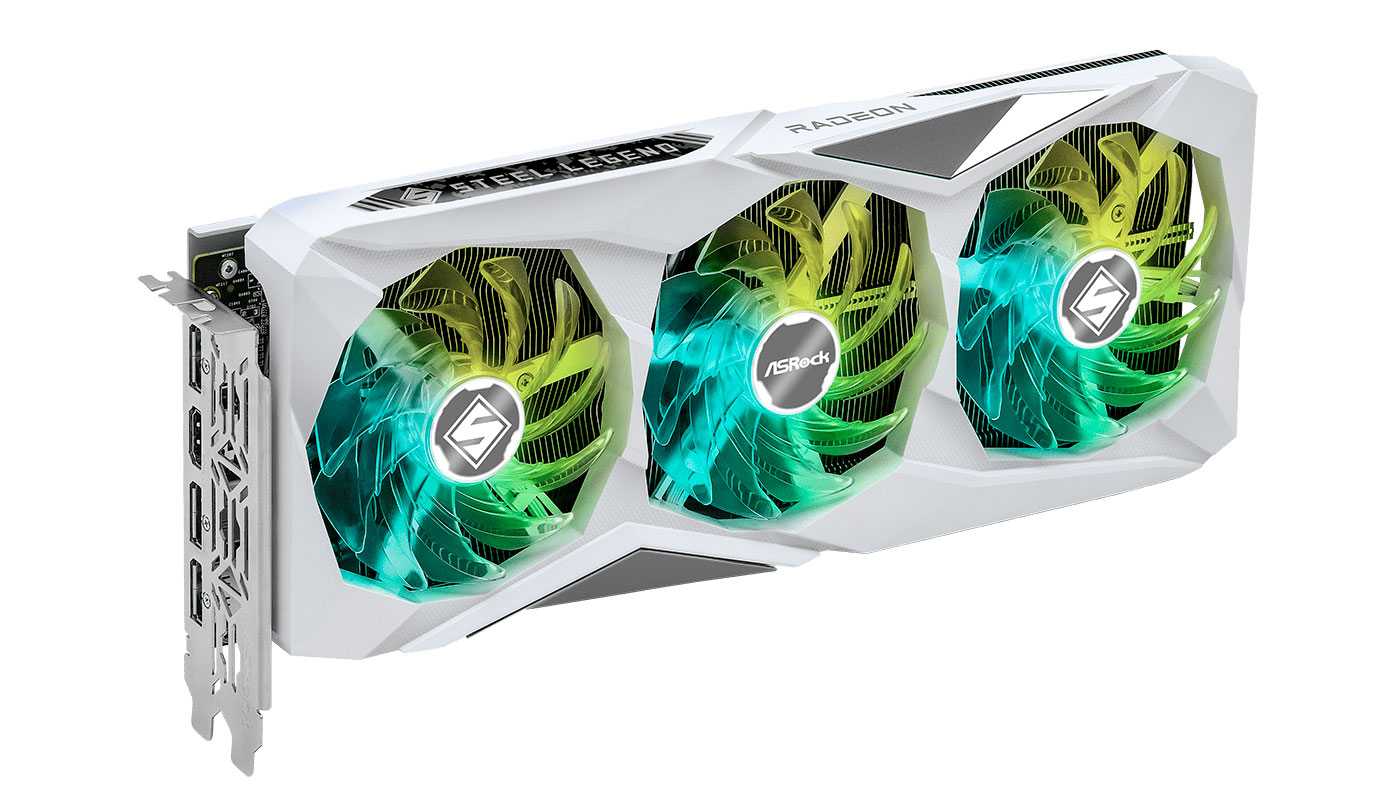
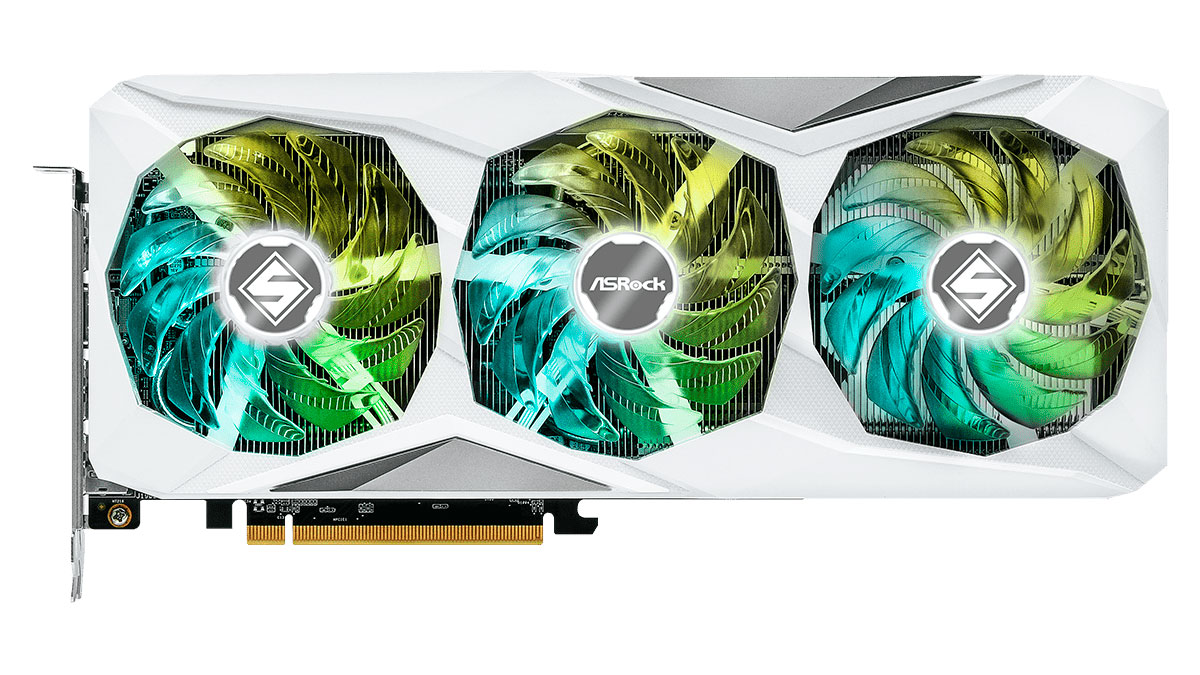
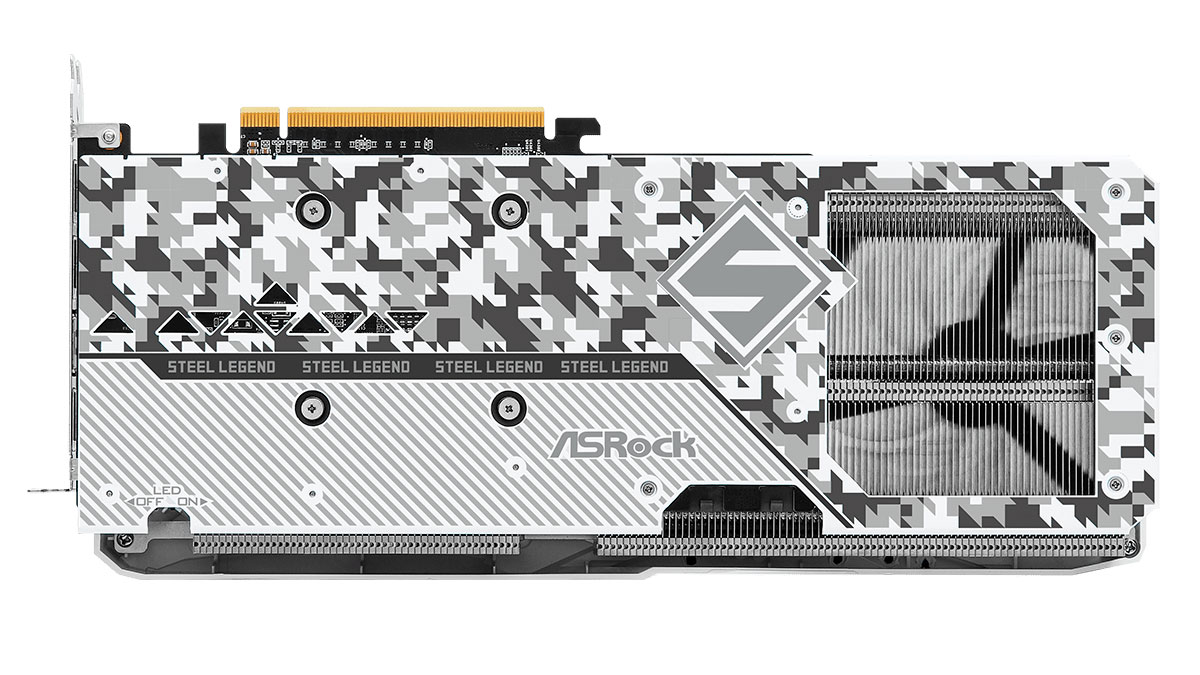
Meanwhile, the Radeon RX 7600 XT Challenger is on the opposite end of the product stack. Measuring just 10.5 inches (267 mm), the graphics card has a toned-down look, with a completely black exterior with white highlights. There is still some illumination, but it's limited to four blue LED indicators. Despite the aesthetic difference with the Radeon RX 7600 XT Steel Legend, the Radeon RX 7600 XT Challenger features similar ingredients, such as the two-ounce copper PCB, 90A power chokes, and a bulky heatsink.
The Radeon RX 7600 XT Challenger functions with a 2,516 MHz game clock but can boost up to 2,799 MHz. It's a hairline slower than the Radeon RX 7600 XT Steel Legend. Therefore, it requires the same dual 8-pin PCIe power connector arrangements and has the same 650W power supply recommendation. Outputs include three DisplayPort 2.1 outputs and one HDMI 2.1 port.
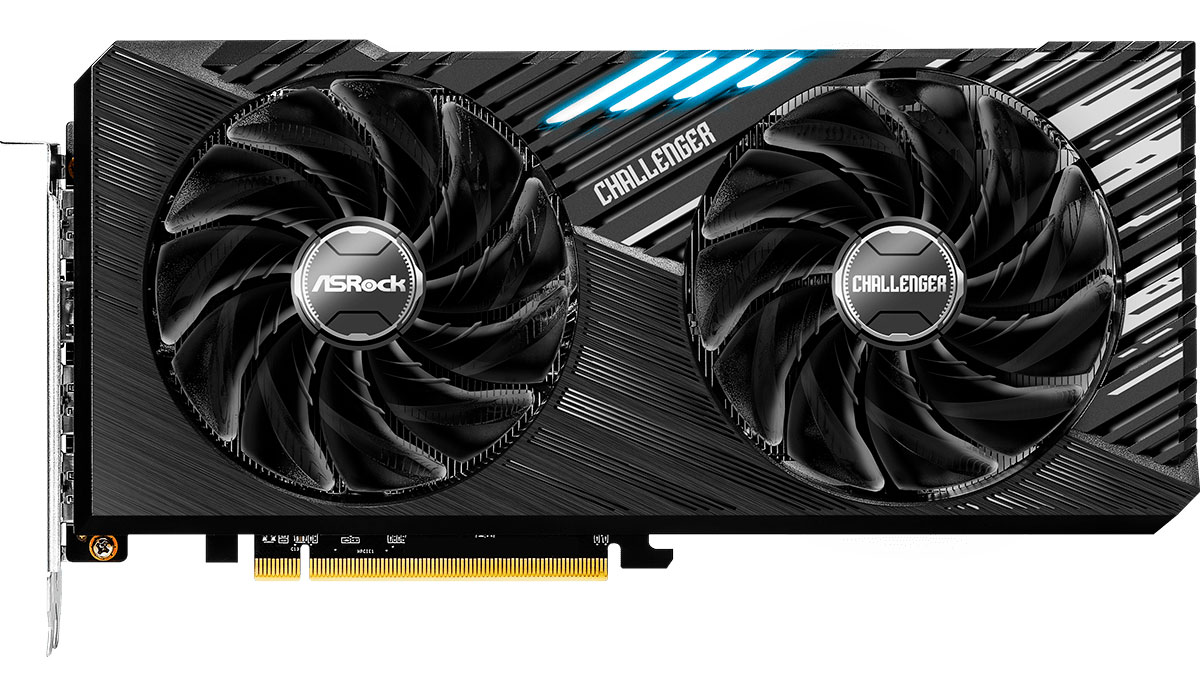
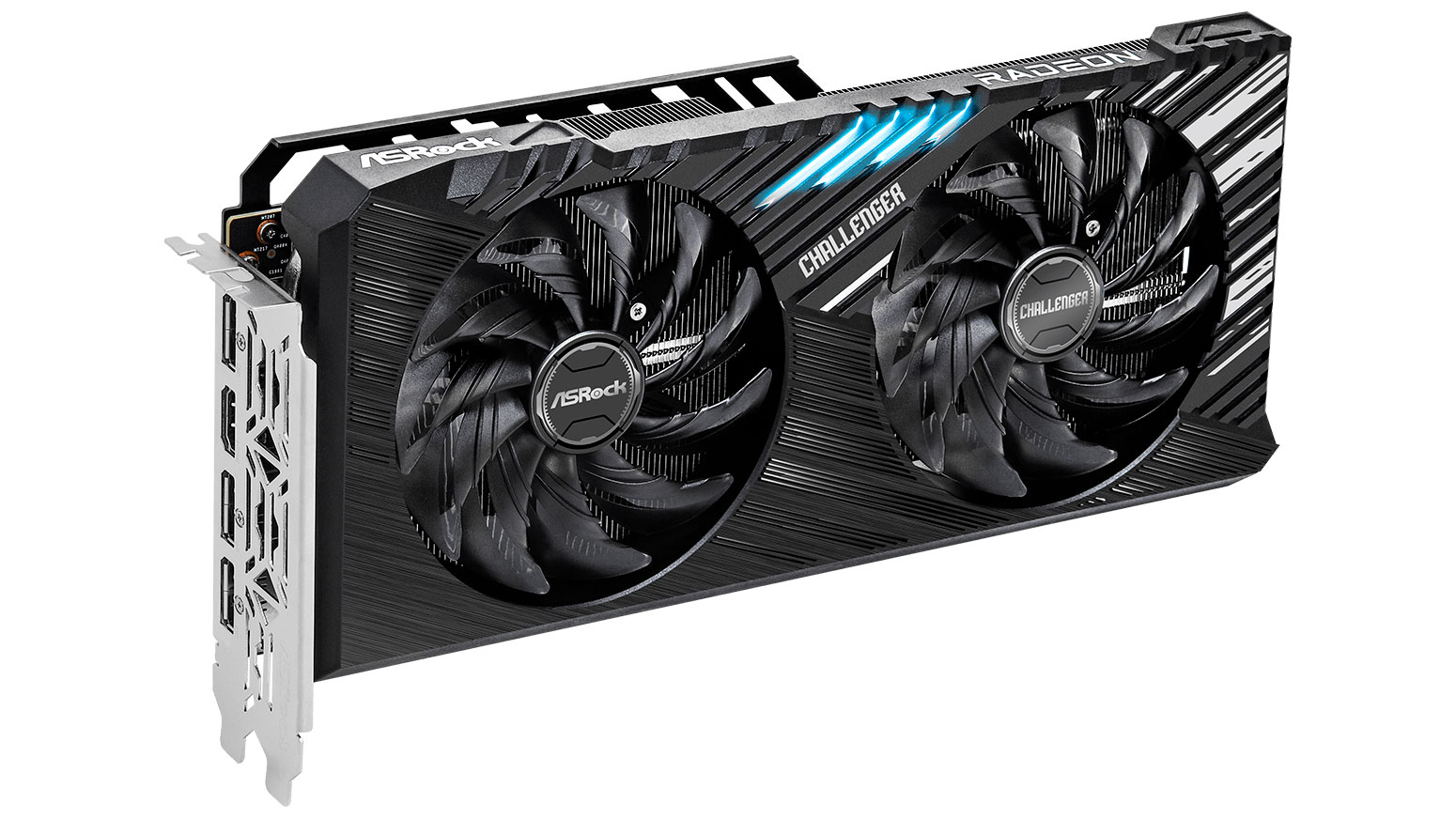
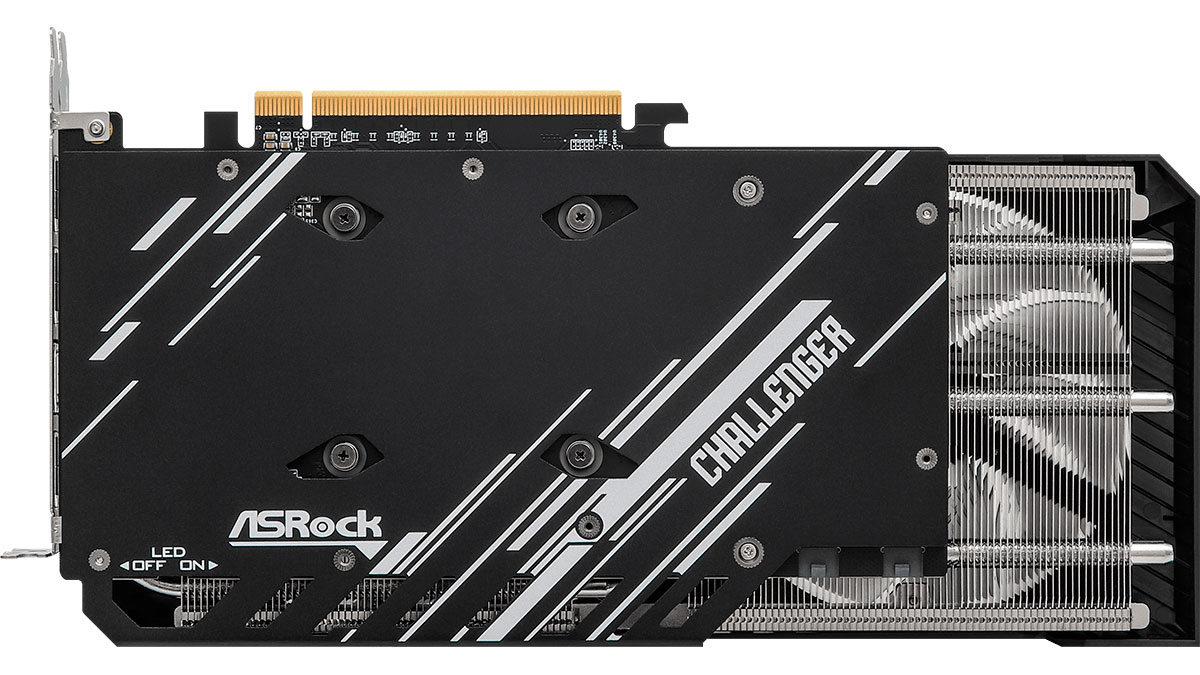
The Radeon RX 7600 XT will launch on January 24 with a SEP (Suggest Etail Price) of $329; therefore, ASRock hasn't revealed the pricing for the Radeon RX 7600 XT Steel Legend (RX7600XT SL 16GO) and Radeon RX 7600 XT Challenger (RX7600X CL 16GO). The former will likely carry a small premium, whereas the latter could arrive at AMD's $329 SEP.
Get Tom's Hardware's best news and in-depth reviews, straight to your inbox.
In terms of competition, the Radeon RX 7600 XT will go up against Nvidia's GeForce RTX 4060 ($299) and Intel's Arc A770 ($329). AMD won't sell an MBA (Made by AMD) model for the Radeon RX 7600 XT, so we'll only see custom models from the chipmaker's AIB partners, such as Acer, ASRock, Asus, Gigabyte, PowerColor, Sapphire, and XFX.

Zhiye Liu is a news editor, memory reviewer, and SSD tester at Tom’s Hardware. Although he loves everything that’s hardware, he has a soft spot for CPUs, GPUs, and RAM.
-
digitalgriffin The 7600XT is about $30 to $40 too expensive at MSRP...Reply
And they are slapping a triple fan on a lower power card that will be dated in 2 years? Has everyone in marketing lost their ever loving mind? That's like slapping an ground effects kit on a Chevy Sonic or Ford Fiesta.
Get the 6700XT or 6700 with 2 fans. -
UnforcedERROR Reply
All of ASRock's cards, excluding their Challenger series, are 3 fans. They use almost identical shrouds across the range, extending into 6000 and 5000-series parts. The Challenger series are the same, they use the same shrouds for both AMD and Intel cards.digitalgriffin said:The 7600XT is about $30 to $40 too expensive at MSRP...
And they are slapping a triple fan on a lower power card that will be dated in 2 years? Has everyone in marketing lost their ever loving mind? That's like slapping an ground effects kit on a Chevy Sonic or Ford Fiesta.
Get the 6700XT or 6700 with 2 fans.
You misunderstand this as marketing, but it's actually saving them money by maintaining the same general design across multiple iterations. -
digitalgriffin Reply
Doesn't mean it's smart to do so. 3 fans are useless on a low powered card like this. All it does is crank up the price on a over priced slow poke card.UnforcedERROR said:All of ASRock's cards, excluding their Challenger series, are 3 fans. They use almost identical shrouds across the range, extending into 6000 and 5000-series parts. The Challenger series are the same, they use the same shrouds for both AMD and Intel cards.
You misunderstand this as marketing, but it's actually saving them money by maintaining the same general design across multiple iterations. -
jlake3 Reply
GPU buyers seem to see that kind of stuff as a premium even if it's unnecessary, and like UnforcedERROR said, they're reusing the shroud across multiple models and even multiple chip brands. Slapping their existing 3-fan cooling solution on a 7600XT likely has rock bottom development costs, and if you're not willing to pay a couple bucks for the extra aluminum and a fan, they have the Challenger.digitalgriffin said:Doesn't mean it's smart to do so. 3 fans are useless on a low powered card like this. All it does is crank up the price on a over priced slow poke card. -
digitalgriffin Reply
And you both are avoiding the point: That 3 fan setup is USELESS on an already overpriced card that is due to be replaced by October.jlake3 said:GPU buyers seem to see that kind of stuff as a premium even if it's unnecessary, and like UnforcedERROR said, they're reusing the shroud across multiple models and even multiple chip brands. Slapping their existing 3-fan cooling solution on a 7600XT likely has rock bottom development costs, and if you're not willing to pay a couple bucks for the extra aluminum and a fan, they have the Challenger.
Now you are looking at $350 for a card that is useless for modern games in 2 years. Even useless now. Way too low powered even at 1080p for games like alan wake 2 without upscaling (which looks horrid at this rez)
This is cheaper and considerably faster.
PowerColor Fighter AMD Radeon RX 6700 XT Gaming Graphics Card with 12GB GDDR6 Memory, Powered by AMD RDNA 2, HDMI 2.1 (AXRX 6700XT 12GBD6-3DH) https://www.newegg.com/powercolor-radeon-rx-6700-xt-axrx-6700xt-12gbd6-3dh/p/N82E16814131783?Item=N82E16814131783&Source=socialshare&cm_mmc=snc-social-_-sr-_-14-131-783-_-01202024 -
UnforcedERROR Reply
No one's avoiding the point. Your point is clearly "this is too expensive and there's no benefit."digitalgriffin said:And you both are avoiding the point: That 3 fan setup is USELESS on an already overpriced card that is due to be replaced by October.
Now you are looking at $350 for a card that is useless for modern games in 2 years. Even useless now. Way too low powered even at 1080p for games like alan wake 2 without upscaling (which looks horrid at this rez)
This is cheaper and considerably faster.
PowerColor Fighter AMD Radeon RX 6700 XT Gaming Graphics Card with 12GB GDDR6 Memory, Powered by AMD RDNA 2, HDMI 2.1 (AXRX 6700XT 12GBD6-3DH) https://www.newegg.com/powercolor-radeon-rx-6700-xt-axrx-6700xt-12gbd6-3dh/p/N82E16814131783?Item=N82E16814131783&Source=socialshare&cm_mmc=snc-social-_-sr-_-14-131-783-_-01202024
First of all, marketing is about moving units, so doing something perceived as beneficial is actually good marketing, even if those benefits are superficial, negligible, or non-existent. Second, as I stated, from a cost of production standpoint this is a good move by ASRock to maintain similar components across their stack. The 3 fans start at the 6650 and run up to the 7800xt (for steel legend parts). Third, whether it's overpriced or not is irrelevant to the issue I'm taking with what you said, as no one's debating the cost proposition of the part.
You may take issue with how practical the design is to the card at hand, or how soon the card may be replaced, or how underpowered it is, or how overpriced it is, but this boils down to personal opinion.
You can't ask why someone in marketing "lost their minds" without looking at the picture as a whole. If you went to the head of ASRock and told them, "this card is terrible, you don't need 3 fans, let's create a different assembly for it that better reflects its power" they'd look at you and ask, "is it going to cost us more money to develop a second fan solution rather than reusing the current one?"
You'd then say yes. They'd then say you're crazy. Now who's crazy? -
digitalgriffin Reply
Why release it at all? Why not make them all challengers?UnforcedERROR said:No one's avoiding the point. Your point is clearly "this is too expensive and there's no benefit."
First of all, marketing is about moving units, so doing something perceived as beneficial is actually good marketing, even if those benefits are superficial, negligible, or non-existent. Second, as I stated, from a cost of production standpoint this is a good move by ASRock to maintain similar components across their stack. The 3 fans start at the 6650 and run up to the 7800xt (for steel legend parts). Third, whether it's overpriced or not is irrelevant to the issue I'm taking with what you said, as no one's debating the cost proposition of the part.
You may take issue with how practical the design is to the card at hand, or how soon the card may be replaced, or how underpowered it is, or how overpriced it is, but this boils down to personal opinion.
You can't ask why someone in marketing "lost their minds" without looking at the picture as a whole. If you went to the head of ASRock and told them, "this card is terrible, you don't need 3 fans, let's create a different assembly for it that better reflects its power" they'd look at you and ask, "is it going to cost us more money to develop a second fan solution rather than reusing the current one?"
You'd then say yes. They'd then say you're crazy. Now who's crazy?
Two words: margins and greed. If card mfg are not making enough profit near MSRP then it's up to them to go back to AMD and tell them to pound sand ala like xfx did. But if they were smart they would form a united front with other board partners and say no. Then AMD wouldn't have a choice.
It looks poorly upon a company who tries to treat the consumer as uninformed idiots in the name of profits. -
UnforcedERROR Reply
Look, I don't disagree with you about card costs being too high, or that unchecked capitalism can be problematic, but a company will do what they can to succeed in whatever market they exist. You can hope for pragmatic morals, but you shouldn't expect it.digitalgriffin said:Why release it at all? Why not make them all challengers?
Two words: margins and greed. If card mfg are not making enough profit near MSRP then it's up to them to go back to AMD and tell them to pound sand ala like xfx did. But if they were smart they would form a united front with other board partners and say no. Then AMD wouldn't have a choice.
It looks poorly upon a company who tries to treat the consumer as uninformed idiots in the name of profits.
The pricing between the two variants is about $20 ($269 vs $289). I also would assume it's about fitting into a niche of white vs black styling. ASRock doesn't strike me as a company that sells boatloads of cards, so I'm sure they're working within some tight constraints for profit margin. I'm speculating, of course, but they offer no Nvidia options, for instance.
That said, you're being dismissive of customers in the same way you're implying the company is. If someone is well-informed they would opt for the Challenger version for $20 less. But, also, if they were well-informed my guess is someone wouldn't be looking at this card anyway.